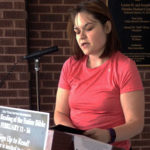- The Explore the Bible lesson for Oct. 27 focuses on Ephesians 4:17-32.
One of the most amazing moments in my life was the first time that my girlfriend (now wife) told me that she loves me. I won’t bore you with all the details, but I will include the fact that she was the first non-family member to ever say that to me, and it literally changed the cadence of my walk. I remember walking into my dorm and one of my dormmates saying: “What happened to you? There is clearly a spring in your step!” But that is what big, life-changing moments can do to you. They alter the way you relate to the world around you. They cause a noticeable change in the way you walk—both in terms of your cadence and how you act overall.
As the Apostle Paul continues his letter to the church at Ephesus in chapter 4, verse 17, he does so with the fourth of his contrasting “previously … but now” commentaries. He intends to encourage and exhort his audience to live out his challenge in 4:1 to live a life worthy of their calling. In the first two sections of our passage, he uses only two long sentences (two paragraphs in most modern translations) to highlight the thoroughgoing difference between their life before Christ and their life after. Then, in the third section. he lists the characteristics that comprise the life of the believer in clear, practical ways.
The Old (4:17-19)
Paul begins by almost begging (I insist, or I urge) his readers to begin walking as Christ would have them walk. His verbs have grown stronger as he has moved through the book, and now he stops to bring together the theology he has expressed by demanding an ethical decision on their part. Will they, understanding that they have been enlightened, walk differently and demonstrate that enlightenment or continue on their old path? Interestingly, he does this by telling his Gentile readers not to live like Gentiles. Their very citizenship has been changed.
At the heart of Paul’s instruction and plea is the reality that the previous life was one of futility, which makes no sense to continue in. Here he doesn’t focus upon a list of sins that they might have committed, but instead is driven by the overarching impact of sin that they lived in as ones who were “futile,” “foolish,” “ignorant,” “hardened,” “lustful” and “deceitful.” The mind itself has been corrupted and incapable of functioning correctly. Like a virus in a computer, the information is there, but it can’t find cohesion, direction or meaning.
Think back over your time before Christ. What things about God and the world around you did you not understand or see as clearly as you do now?
The Change (4:20-24)
As Paul is moving toward his explanation of their current status before God, he takes his readers on a journey of the path that brought them to their present state. Interestingly, he links this journey to the outcome in such a way that it is clear once it has been undertaken, there is no going back. Indeed, the contrast of the whole passage begins with the journey itself (you, however, did not come to know Christ that way), so that it is not just the end result that warrants consideration, but the entire transformative work he calls us to see as significant.
In order to highlight the significance of the change, Paul uses three images. The first image is the instruction of the mind. Paul mentions in verse 20 they did not “learn Christ that way.” In this phrase, Paul highlights a theme that he will persist in for the remainder of the passage—having the mind of Christ. Jesus is not merely the subject of the lesson, he is the teacher and the location of the lesson as well.
Second, Paul uses the image of changing clothes. He describes the process as taking off and putting on. The image would have been a powerful in a culture where changes of clothing were rare and were considered big moments in and of themselves. The way it is phrased here leaves open the possibility that this change of clothing might be a continuing work rather than merely a past work. Such is to be expected, however, if we are talking about a lifestyle change and not just a transaction.
The third image Paul uses of having a new spirit, which is creation language. The phrase “made new in the attitude of your minds” in verse 23 is literally “made new in the spirit of your mind.” Such a concept takes us back to creation itself and is stating that which was corrupted in the fall has been made new in Christ.
Sign up for our weekly edition and get all our headlines in your inbox on Thursdays
How is having the mind of Christ different from learning things about Christ? A change of clothes is not a big thing today, like it was in the first century. What are some images Paul might have used to illustrate the enormity of the change that God brings to our being through Christ?
The New (4:25-32)
This last section of our text is further explanation of what Paul has highlighted as the change in the previous verses. In particular, Paul is giving a very clear description of what life in Christ looks like. Since the work of Christ is, in many ways, an internal transformation, how does this change manifest itself publically?
Paul chooses five issues to illustrate his point—truth, anger, theft, speech and love. His point is not to lay out another set of contrasts—being angry versus being angry without sinning. Rather, it is to highlight places where such sins may naturally occur and to call us to resist such a progression. In doing this, he is highlighting the pull that life still has on believers toward sin and the need for wisdom to avoid such a pull.
Additionally, since Paul is not very direct in his explanation, it seems this list is meant to be a broad appraisal of common life issues, rather than an address of specific problems in Ephesus. As such, it has direct implications for us. He concludes this list with an injunction not to grieve the one who is the source of the change that Paul is highlighting—the Holy Spirit. Instead, let the Holy Spirit carry out his full work and take personal responsibility to act by getting rid of such things.
What are your personal hotspots that trigger temptation to fall into sins you left behind when you came to Christ?
Timothy Pierce, Ph.D., is assistant professor of religion at East Texas Baptist University.














We seek to connect God’s story and God’s people around the world. To learn more about God’s story, click here.
Send comments and feedback to Eric Black, our editor. For comments to be published, please specify “letter to the editor.” Maximum length for publication is 300 words.